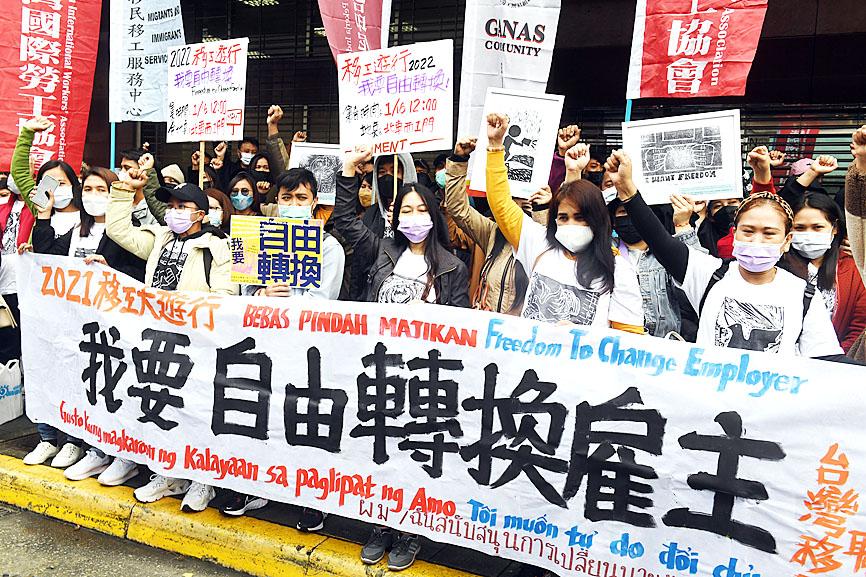Migrant workers should be allowed to change employers, a coalition of migrant rights groups and migrant worker organizations said yesterday as they rallied outside the Ministry of Labor in Taipei, urging the public to join them in a march next month.
Migrant workers can only start a new job if they are not at fault for losing their previous one, such as when their factory closes down, fishing boat sinks, or when their employer dies or loses the right to employ them after contravening the law, said Ella Weng (翁倩文), a representative of the Migrants Empowerment Network in Taiwan, a coalition of seven migrant rights groups that co-organizes the labor rights march on Jan. 16.
Outside of those reasons, a migrant worker can only change jobs if their employer agrees, Weng added.

Photo: CNA
“As Taiwanese, we all know what freedom is, but if migrant workers need their employers to agree to them changing jobs, is that really freedom?” Weng said. “If Taiwanese needed the signature of their employers to resign from their jobs, could you accept that?”
Weng asked Taiwanese to put themselves in the shoes of migrant workers and understand the struggles they are facing.
At the rally, a 36-year-old Indonesian caretaker who gave her name as Ani said that she last month left her job at a long-term care facility after her employer refused to pay her for overtime work.
She had no access to the records of her hours, she said, adding that she now lives in a shelter for stranded migrant workers.
Her employer made her work excessive hours and refused to agree to her request to change jobs, Ani said, adding that her employer told her it was illegal for her to reach out for help.
“I really want to ask everyone, do Taiwanese also need to have their employer’s permission to change jobs?” Ani said.
A 41-year-old care worker from the Philippines who gave her name as Janice said she is also staying at a shelter because her employer had mistreated her.
“They treated me like an animal, not like a human. I suffered a lot,” Janice said.
Her employer forced her to wear a mask at all times, except for when she was sleeping or taking a shower, Janice said.
She left her employer in New Taipei City about three months ago and has not had any income since then, Janice said, adding that she has three children to support in the Philippines.
Fajar, who is president of Indonesian workers solidarity group Ganas Community, said that Taiwan’s laws should conform to international standards and not fall behind the times.
“We invite everyone who cares about the rights of migrant workers to join us on our march on January 16, in hopes that Taiwanese society will understand and that the government will abolish the law restricting the freedom to transfer jobs, which is the root of [our] oppression,” Fajar said.
Participants in the Jan. 16 event are to gather at Taipei Railway Station’s west entrance at noon before marching to the headquarters of the governing Democratic Progressive Party at 1pm and afterwards to the labor ministry, the network said in a statement.
Ministry data showed that there were 675,672 migrant workers in Taiwan at the end of last month.

The manufacture of the remaining 28 M1A2T Abrams tanks Taiwan purchased from the US has recently been completed, and they are expected to be delivered within the next one to two months, a source said yesterday. The Ministry of National Defense is arranging cargo ships to transport the tanks to Taiwan as soon as possible, said the source, who is familiar with the matter. The estimated arrival time ranges from late this month to early next month, the source said. The 28 Abrams tanks make up the third and final batch of a total of 108 tanks, valued at about NT$40.5 billion

Travel agencies in Taiwan are working to secure alternative flights for travelers bound for New Zealand for the Lunar New Year holiday, as Air New Zealand workers are set to strike next week. The airline said that it has confirmed that the planned industrial action by its international wide-body cabin crew would go ahead on Thursday and Friday next week. While the Auckland-based carrier pledged to take reasonable measures to mitigate the impact of the workers’ strike, an Air New Zealand flight arriving at Taipei from Auckland on Thursday and another flight departing from Taipei for Auckland on Saturday would have to

A group from the Taiwanese Designers in Australia association yesterday represented Taiwan at the Midsumma Pride March in Melbourne. The march, held in the St. Kilda suburb, is the city’s largest LGBTQIA+ parade and the flagship event of the annual Midsumma Festival. It attracted more than 45,000 spectators who supported the 400 groups and 10,000 marchers that participated this year, the association said. Taiwanese Designers said they organized a team to march for Taiwan this year, joining politicians, government agencies, professionals and community organizations in showing support for LGBTQIA+ people and diverse communities. As the first country in Asia to legalize same-sex

MOTIVES QUESTIONED The PLA considers Xi’s policies toward Taiwan to be driven by personal considerations rather than military assessment, the Epoch Times reports Chinese President Xi Jinping’s (習近平) latest purge of the Chinese People’s Liberation Army (PLA) leadership might have been prompted by the military’s opposition to plans of invading Taiwan, the Epoch Times said. The Chinese military opposes waging war against Taiwan by a large consensus, putting it at odds with Xi’s vision, the Falun Gong-affiliated daily said in a report on Thursday, citing anonymous sources with insight into the PLA’s inner workings. The opposition is not the opinion of a few generals, but a widely shared view among the PLA cadre, the Epoch Times cited them as saying. “Chinese forces know full well that